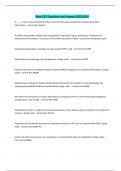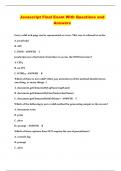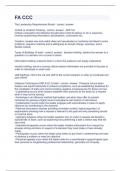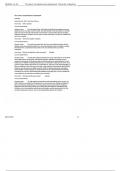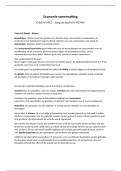PSYCHONEUROIMMUNOLOGY
OVERVIEW IMMUNE SYSTEM
Immune system (IS):
- Highly complex network consisting of different tissues, cells, cell products and
processes, which are interconnected via the blood circulation and the lymphatic
system
- Main task: protects body against various pathogenic microorganisms from: a)
Outside the body (eg: viruses, bacteria, allergens, etc.)
b) Inside the body (eg: body cells with uncontrolled growth such as tumors)
- Main parts:
o Blood: Leukocytes (=white blood cells) such as lymphocytes
o Lymphatic system (development/storage of lymphocytes): primary: thymus
and bone marrow; secondary: lymph nodes, spleen, etc.
- Main (broad) classification options:
o Non-specific innate vs. Specific acquired
o Humoral (antibody-mediated) vs. cellular (cell-mediated) immunity
1
,Cells of the immune system:
- Lymphocytes (25-40% of Leukocytes):
o B-Lymphocytes (acquired IS)
o T-Lymphocytes (acquired IS)
o Natural killer cells (NK; innate IS; Targets: tumor and virus-infected cells)
- Granulocytes (50-70% of Leukocytes)
o (eg: Neutrophils, Eosinophils, Basophils)
o release enzymes after contact with bacteria (innate IS)
- Monocytes and Macrophages (3-8% of Leukocytes)
o = phagocytes (consume and destroy invaders; innate IS)
o initiate acquired immune system
à innate aquired: vanaf geboorte
Cytokines: communication in IS:
- Small proteins, released from immune cells and other cells
- Important for cell signaling (like hormones): pro- and anti-inflammatory effects
à cytokines: messengers, signaleren
- Modulate balance between humoral and cellular immune responses
- Regulate development and responses of specific cell populations
- Cytokines can increase or decrease action of other cytokines:
- Interleukins (eg: IL-1, IL-2, IL-4, IL-6,...; produced i.a. in lymphocytes)
- messengers in different immune responses, eg: growth of granulocytes
- Interferons (eg: IFN-α, IFN-β, IFN-ɣ; produced in different sites)
- messenger in different immune responses; anti-viral, inhibit tumor growth
- Tumor necrosis factor-alpha (TNF-α; produced in macrophages) - induces cell death
in tumor cells
- Transforming growth factor beta (TGF-β; produced in tumor cells) - promotes
development of tumor cells
- Colony-stimulating factors (CSFs; promote growth/differentiation of cells)
- Chemokines (promote chemotaxis between cells)
à chemotaxis: een celorganisme w aangetrokken tot een andere door chemische
balans
2
, antibody: gaan naar target en vernietigen het
cell mediated: ene cel gaat naar andere cel en vernietigt die
- Innate: onthoudt niet wat en of het al iets gedaan heeft, het reageert altijd op
dezelfde manier
- Acquired: gaat naar specifieke pathogenen/virussen
à als het al eens heeft gewerkt tegen 1 specifiek virus: slaat dat op in geheugen voor
volgende keer dat het tegengekomen w dan kan het systeem sneller erop reageren
3
OVERVIEW IMMUNE SYSTEM
Immune system (IS):
- Highly complex network consisting of different tissues, cells, cell products and
processes, which are interconnected via the blood circulation and the lymphatic
system
- Main task: protects body against various pathogenic microorganisms from: a)
Outside the body (eg: viruses, bacteria, allergens, etc.)
b) Inside the body (eg: body cells with uncontrolled growth such as tumors)
- Main parts:
o Blood: Leukocytes (=white blood cells) such as lymphocytes
o Lymphatic system (development/storage of lymphocytes): primary: thymus
and bone marrow; secondary: lymph nodes, spleen, etc.
- Main (broad) classification options:
o Non-specific innate vs. Specific acquired
o Humoral (antibody-mediated) vs. cellular (cell-mediated) immunity
1
,Cells of the immune system:
- Lymphocytes (25-40% of Leukocytes):
o B-Lymphocytes (acquired IS)
o T-Lymphocytes (acquired IS)
o Natural killer cells (NK; innate IS; Targets: tumor and virus-infected cells)
- Granulocytes (50-70% of Leukocytes)
o (eg: Neutrophils, Eosinophils, Basophils)
o release enzymes after contact with bacteria (innate IS)
- Monocytes and Macrophages (3-8% of Leukocytes)
o = phagocytes (consume and destroy invaders; innate IS)
o initiate acquired immune system
à innate aquired: vanaf geboorte
Cytokines: communication in IS:
- Small proteins, released from immune cells and other cells
- Important for cell signaling (like hormones): pro- and anti-inflammatory effects
à cytokines: messengers, signaleren
- Modulate balance between humoral and cellular immune responses
- Regulate development and responses of specific cell populations
- Cytokines can increase or decrease action of other cytokines:
- Interleukins (eg: IL-1, IL-2, IL-4, IL-6,...; produced i.a. in lymphocytes)
- messengers in different immune responses, eg: growth of granulocytes
- Interferons (eg: IFN-α, IFN-β, IFN-ɣ; produced in different sites)
- messenger in different immune responses; anti-viral, inhibit tumor growth
- Tumor necrosis factor-alpha (TNF-α; produced in macrophages) - induces cell death
in tumor cells
- Transforming growth factor beta (TGF-β; produced in tumor cells) - promotes
development of tumor cells
- Colony-stimulating factors (CSFs; promote growth/differentiation of cells)
- Chemokines (promote chemotaxis between cells)
à chemotaxis: een celorganisme w aangetrokken tot een andere door chemische
balans
2
, antibody: gaan naar target en vernietigen het
cell mediated: ene cel gaat naar andere cel en vernietigt die
- Innate: onthoudt niet wat en of het al iets gedaan heeft, het reageert altijd op
dezelfde manier
- Acquired: gaat naar specifieke pathogenen/virussen
à als het al eens heeft gewerkt tegen 1 specifiek virus: slaat dat op in geheugen voor
volgende keer dat het tegengekomen w dan kan het systeem sneller erop reageren
3

